Janusz Walus: Why far-right Polish football fans idolise a murderer in South Africa
- Published
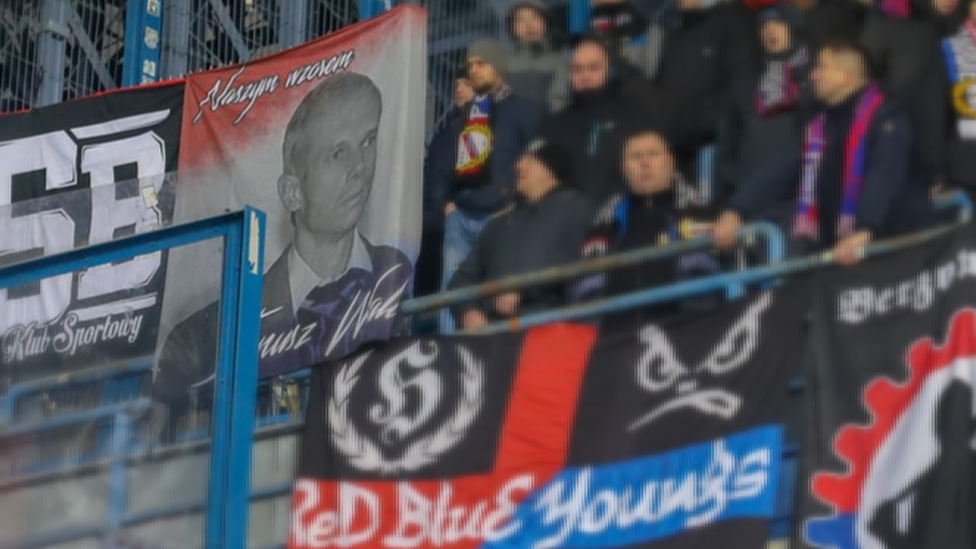
Banners supporting Walus are a common feature in Polish football stadiums
Huge banners bearing the portrait of Janusz Walus can often be seen draped around football stadiums in Poland calling for the freedom of a man serving a life sentence in South Africa for the 1993 murder of prominent anti-apartheid leader Chris Hani.
Many feared that Hani's killing could provoke a racial war, coming at a crucial point in talks for the white minority to hand over power, which eventually happened when Nelson Mandela became president the following year after the country's first all-race elections.
It is unclear how Walus became a symbol for young Polish nationalists and fascists but about 10 years ago, he started receiving letters from supporters in Poland, journalist Cezary Lazarewicz, who interviewed Walus for his book, told the BBC.
"They wrote to him that they admired him because he tried to stop communism in South Africa, that he is the great hope of the white race," he said.
In pictures and videos posted online some of the football fans in the stands are carrying scarves with the hashtag #StayStrongBrother printed on them.
It's inspired by a song dedicated to him which includes the lyrics: "A few men could ever take the step you did, to enter the path of glory and victory".
"The fans are not calling on Walus' release on humanitarian grounds, but they are glorifying what he did and the ideology," Dr Rafal Pankowski, from Never Again association, an anti-racist group, told the BBC.
The song, which is sung in English, is "a good example of the internationalisation of contemporary white nationalism," he adds.

Who was Chris Hani?

Leader of the South African Communist Party
Chief of staff of uMkhonto we Sizwe, the armed wing of the African National Congress (ANC), allied to the SACP
Launched attacks against apartheid government
Seen as a potential successor to Nelson Mandela
Assassinated on 10 April 1993

Walus, an immigrant from Poland who had acquired South African citizenship, and his co-defendant Clive Derby-Lewis, were sentenced to death shortly after Hani's killing, but the sentence was commuted to life sentence after South Africa abolished the death penalty.
They both appealed for amnesty during the Truth and Reconciliation Commission (TRC) in 1997, with Walus saying that he was driven by political, anti-communist motives to kill Hani, who was then the secretary-general of the South African Communist Party (SACP), and also a leading figure in the armed wing of the African National Congress. The two parties were close allies in the fight against apartheid.
Their appeal was rejected.
Derby-Lewis, who provided the gun used to kill Hani, died in 2016, a year after he was granted parole for health reasons.
Walus, who is serving his life sentence at a maximum security prison in Pretoria, continues to find fame online.
Even more shockingly, the range of merchandise supporting him and celebrating him as a "political prisoner" has been sold on a South African-owned online market website.
Removal not enough
The BBC confirmed that scarves, a T-shirt, and a sticker bearing the name and image of Janusz Walus had been put up for sale on OLX's Polish website. These items have since been removed.
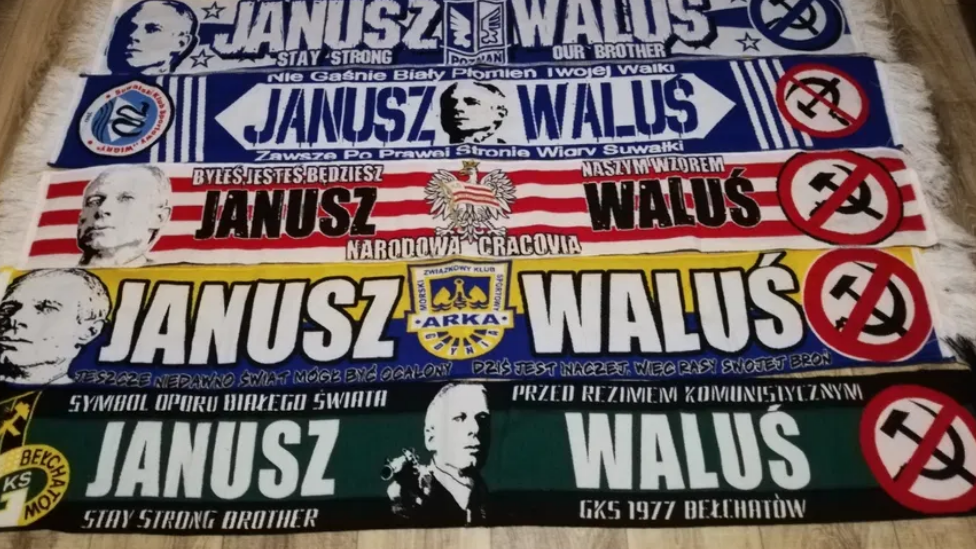
Scarves from several football clubs were among those removed from OLX
OLX is owned by technology-investment company Prosus, a subsidiary of South African-based global tech giant Naspers.
The Never Again association reported the sale of the Walus items and other "racist" items to OLX.
"Promoting fascism or racial hatred is prohibited by the Polish law but the implementation of the law is notoriously weak," Dr Pankowski said.
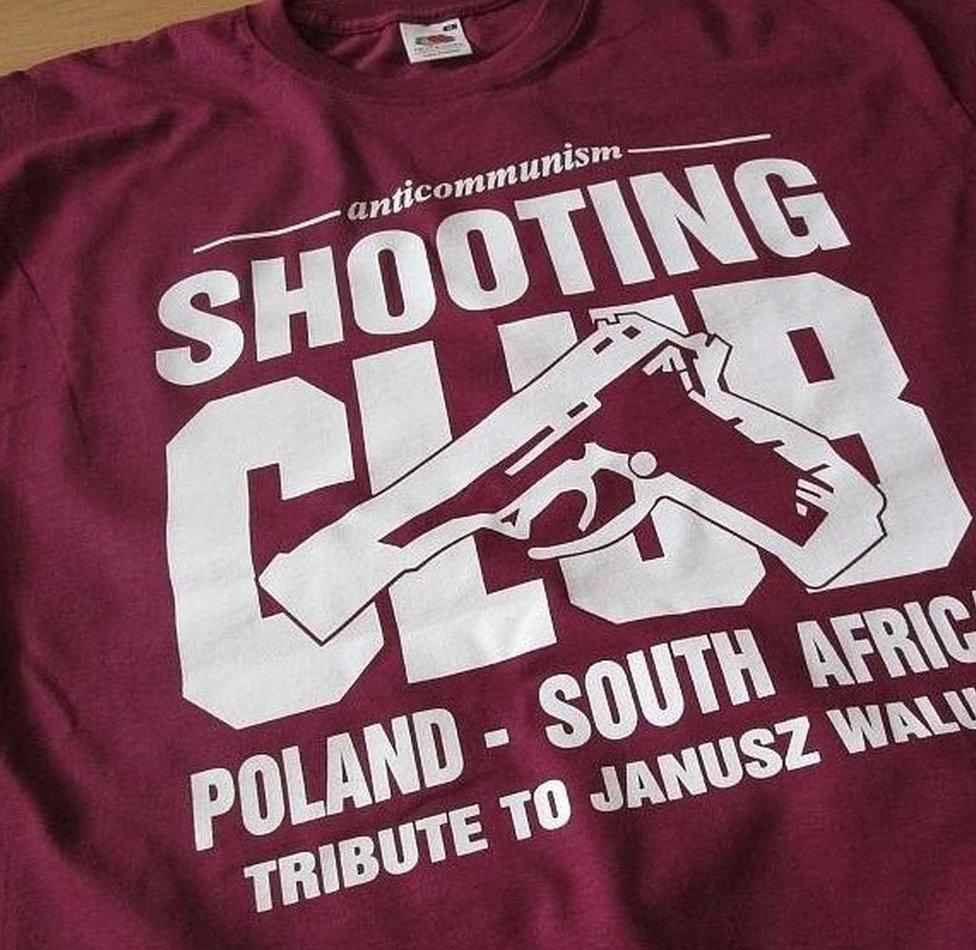
This T-shirt was put up for sale on the OLX platform
OLX Poland's regulations also prohibit selling items containing "content inciting hatred based on national, ethnic, racial, religious differences or due to non-denominational status".
In a statement to the BBC, Naspers said that "right-wing elements in Poland have violated the terms of use of the OLX Poland platform. Although they only managed to do so to a very limited extent, any content that incites violence, racism, or discrimination is abhorrent and contrary to the values and beliefs of our organisation".
"Our systems use technology automatically to identify and remove listings that violate OLX's policies," spokesperson Shamiela Letsoalo said.
The Walus items were not listed under his name and so the system missed them, the statement said, adding that they were "swiftly removed" after the team was notified.
But this isn't enough for SACP spokesman Alex Mashilo, who told the BBC that Naspers had "to take action, more than what they said out of convenience".
He added that the party would "consider this matter further and decide the next steps to adopt".
'Unrepentant'
One explanation for the rise in visibility of Walus' cause is a series of court and government decisions which led to the quashing of a 2016 decision to release him on parole.
Hani's family and the SACP had opposed the move even after South African authorities stripped Walus of his citizenship in 2017, clearing the way for him to be deported to Poland if he was freed from prison.
In March, the justice ministry finally ruled out his release.
Walus is "unrepentant except for his pretences to be seen to be complying with parole eligibility," Mr Mashilo said.
"The uncorrectable assassin who almost plunged South Africa into a civil war with far-reaching implications must not be released on parole. As things stand, there has been no full disclosure of the truth and all the circumstances surrounding Hani's assassination," Mr Mashilo added.
He said questions remained about the gun used to kill Hani.
"The murder weapon that the man pulled the trigger of was taken from military armoury. Who took it, whose hands did it go through... to [get to] its destination, Walus, and his assassination of Hani?" he asked.
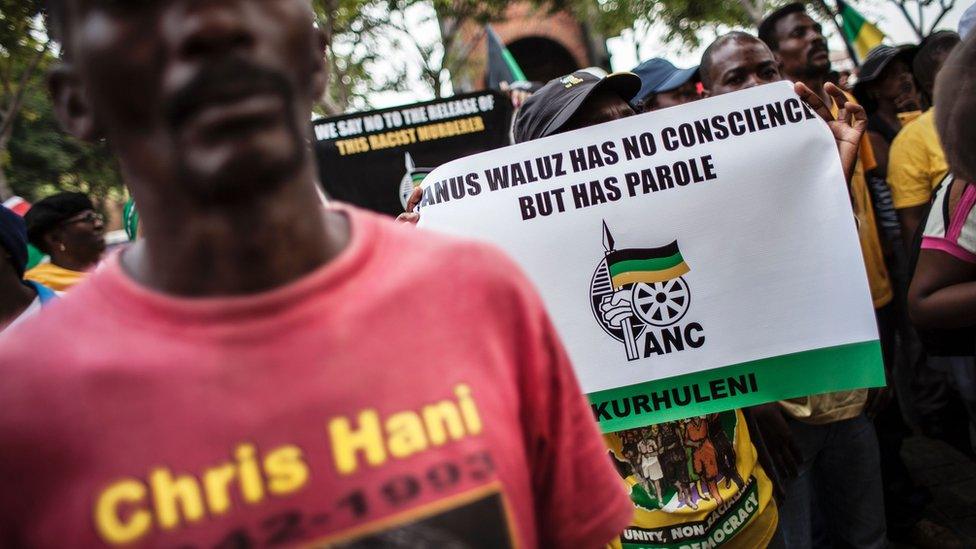
Supporters of the ruling ANC party have also been opposed to freeing Walus on parole
The last time most South Africans saw Walus was during the TRC sessions, answering questions about Hani's murder.
At some point during the hearings he locked his head in a slightly titled position and shot a blank but searing stare across the room - it's a look like this which can be seen on display in scarves and banners in Polish football stadiums.
Last year an audio message from Walus was uploaded to YouTube and Facebook, in which he thanked his fans for raising legal fees and buying sports equipment.
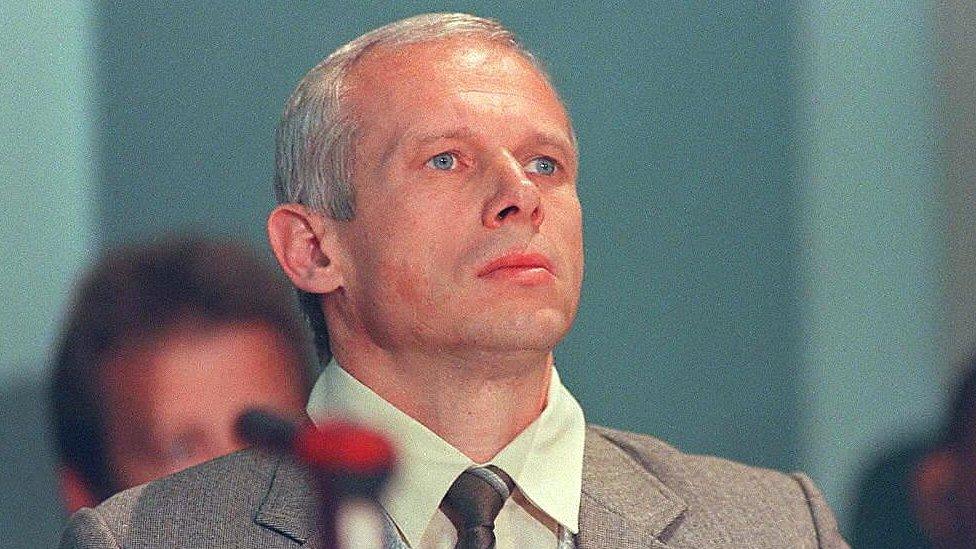
Walus told Polish journalist Lazarewicz he believes black people and white people should live separately
When Lazarewicz visited Walus two years ago for an interview, he found a man who, 25 years after his incarceration, was unrelenting in his convictions.
"Four years ago Walus met in prison with Hani's daughter - Lindiwe. He told her [that] when he lost his father [in 1997] then he understood that Chris Hani was not only a communist, but he was also a father and husband," Lazarewicz said.
"Walus told me that he was very sorry for killing Lindiwe's father. But he never regretted [killing a] communist leader. He told me, in 1993, there was a war in South Africa and he felt like a soldier... he still believes in the system of racial segregation and that whites and blacks should live apart," he added.
This could explain why Walus has become an icon of white supremacist groups.
So even as his supporters call for his freedom in football games in Poland, it's their shared allegiance to a racist ideology that will block any chance of parole and confine him to prison for the rest of his life.
- Published5 December 2013
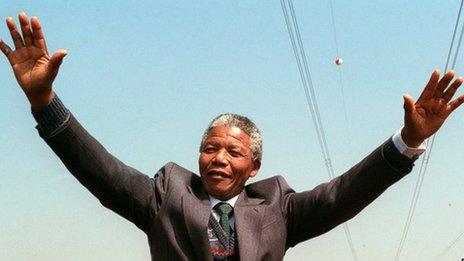
- Attribution
- Published22 January 2016
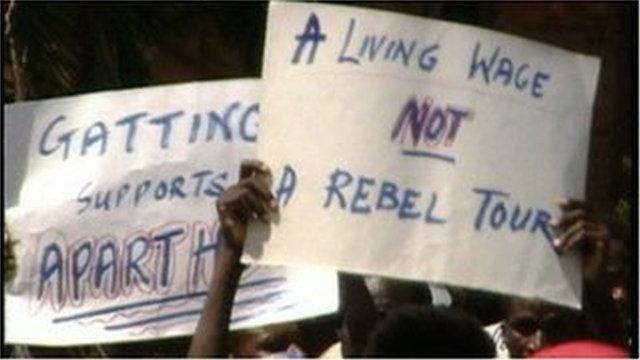
- Published18 February 2020
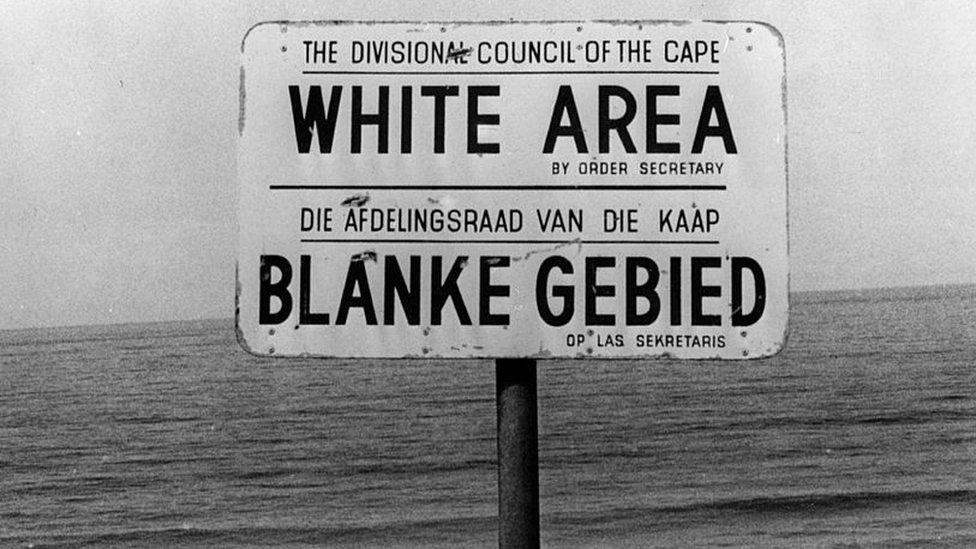
- Published13 December 2016
